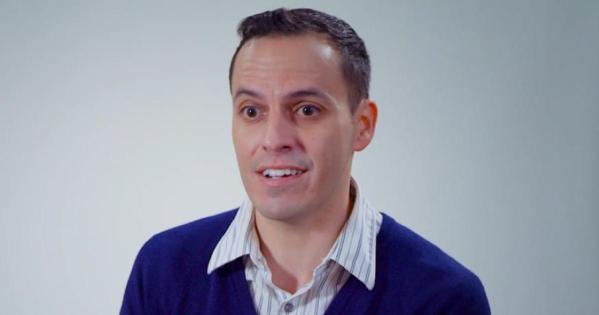SPA Professor Tracks Political Socialization Differences Among People with Same-Sex Parents

Partisan division has dominated the national discussion this year, but how are political attitudes developed? The concept of political socialization has been around at least since the 1940s, as scholars wondered how young people come to understand their social and political world and form ideological values. Teachers, role models, and peers all contribute to the process, but researchers say parental influence can be the most pervasive and lasting.
SPA Assistant Professor Andrew Flores wondered if that process resulted in a distinctive political socialization experience for young people with same-sex parents, and used a large and novel dataset to answer the question. Flores has just published “Potential Differences between the Political Attitudes of People with Same-Sex Parents and People with Different-Sex Parents: An Exploratory Assessment of First-Year College Students,” coauthored with former student Maisy Morrison of Mills College, in the journal PLOS One.
“People tend to couple with people who have similar value systems, which means that the households can be somewhat more homogenous, [which] allows for the passage of these values to children,” said Flores. “[Even after] the teenage rebellious years, as younger people grow older they still tend to go toward the values instilled in them in their youth.”
Flores and Morrison acquired data on 141,189 college students from the 2015 administration of The Freshman Survey, conducted by the Higher Education Research Institute (HERI) at UCLA, the same year of the Obergefell v. Hodges ruling that recognized marriage between same-sex couples. Flores’ study is the first large-n quantitative work to assess the relationship between the LGBT status of parents and the political ideology of children: previous literature was qualitative in nature and less robust.
The 1990s brought the first significant research documenting the distinctive political attitudes and behaviors of LGBT people. “Exit poll indicators from 1992 showed that over 80% of LGBT voters voted for the Democratic presidential candidate. That kind of homogeneity is not seen across many other demographic categories or groups,” said Flores.
This unity among LGBT voters extends to progressive issues like economic policy, immigration policy, marijuana decriminalization, and policy international relations. Further, said Flores, qualitative studies show that when major events occur regarding the rights of same-sex couples and of LGB households, parents feel motivated to talk to their children about LGBTQ rights, equality, and justice, contributing to the process of political socialization.
The research questions also concerned gender differences. “There is a literature that says that boys and girls are socialized into politics differently,” said Flores. “Males feel far more at liberty to deviate from their parents' political orientations and values and explore different questions and politics, testing out different views. Girls come to understand politics as more of a male-dominated space, and tend to become disinterested.”
Surprisingly, while the study results yielded interesting insights on the dynamics of socialization, they revealed that the differences between same-sex and different sex parents were not statistically significant.
“We do not find that people with same-sex female or male parents are much different from people DS parents,” the article reads. “Indeed, on some measures people with same-sex male parents are more conservative than similarly situated people with DS parents.”
While study limitations may have muted these differences (the survey focused on college freshman, representing a more politically progressive younger generation, and depended on self-reported data), Flores’ findings revealed divergences based on the composition of same-sex couples.
“Males with same-sex female parents tend to be slightly more politically progressive, whereas males with same-sex male parents tend to somewhat more conservative when compared to males in different-sex households,” he explained. “Same-sex female couples are far more likely to be raising their own children, be people of color, and have lower household incomes compared to people with different-sex households or same-sex male households.” Financial barriers (such as those related to adoption or surrogacy) might be more likely to limit males in same-sex relationships from becoming parents.
Flores looks forward to future research, in which he should be able to pool later years of this annually-collected data. In addition, he is actively obtaining data for a large representative sample of LGBT adults from diverse populations, including immigrants, non-English speakers, and communities of color, and hopes to check for the same relationships of political socialization and disclose more nuanced LGBT political attitudes.
However, this study represented a significant first step in the quantitative analysis of political socialization within same-sex households.
“This was a great opportunity to take advantage of novel data, to think about a question that couldn't really be asked from other [smaller] surveys,” said Flores.
